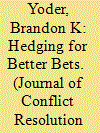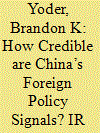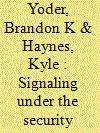|
|
|
Sort Order |
|
|
|
Items / Page
|
|
|
|
|
|
|
| Srl | Item |
| 1 |
ID:
188888


|
|
|
|
|
| Summary/Abstract |
How can states de-escalate a crisis and avoid spiraling toward war? Doing so requires the actors to reassure each other of their willingness to issue and commit to concessions.Footnote1 Yet reassurance is fundamentally difficult: states have incentives to misrepresent their aims as moderate in order to dupe the other into offering concessions and drawing down its military readiness, only to renege and issue further demands in the future. Thus, credible signaling mechanisms are essential for peaceful crisis resolution.
|
|
|
|
|
|
|
|
|
|
|
|
|
|
|
|
| 2 |
ID:
165260


|
|
|
|
|
| Summary/Abstract |
How can declining states reliably infer the intentions of rising states? One prominent line of argument maintains that because declining states face intractable uncertainty about rising states’ future intentions, preventive war is often unavoidable even between states with truly compatible goals. This article presents a dynamic model of reassurance in which actors are uncertain whether or not their interests conflict. The model shows that by adopting a hedging strategy of limited containment short of war, declining states can reduce risers’ incentives to send dishonest cooperative signals. This, in turn, makes cooperation more credible as a signal of risers’ benign intentions. Moreover, these signals are sufficiently informative to dissuade the decliner from escalating to preventive war even under large power shifts. Thus, although power shifts promote limited competition among states with compatible goals, preventive war rationally occurs only in a bargaining context when the riser’s goals are known to be incompatible.
|
|
|
|
|
|
|
|
|
|
|
|
|
|
|
|
| 3 |
ID:
175856


|
|
|
|
|
| Summary/Abstract |
Scholars and policymakers currently lack systematic criteria for determining the credibility of China's foreign policy signals, which has produced widely divergent conclusions about its likely intentions. ‘China optimists’ view China’s cooperative signals as credible, while dismissing its noncooperative behaviors as unrepresentative of its broader preferences. Conversely, ‘China pessimists’ see China’s cooperative signals as non-credible misrepresentation and focus on China’s recent ‘assertive’ behavior. Drawing on theoretical scholarship on signaling and credibility in international relations, this article introduces general deductive criteria for assigning credibility to a rising state’s foreign policy signals. It then applies these criteria to evaluate the specific Chinese signals that optimists and pessimists have cited in support of their respective positions. The analysis finds that both optimists and pessimists have overlooked multiple conditions that have reduced the credibility of China’s cooperative and noncooperative foreign policy signals alike. This implies that far more uncertainty about China’s intentions is warranted than has been acknowledged on either side of the current debate.
|
|
|
|
|
|
|
|
|
|
|
|
|
|
|
|
| 4 |
ID:
192096


|
|
|
|
|
| Summary/Abstract |
Recent China-India relations have been marked by a puzzling mix of cooperation and rivalry across military, economic, institutional and normative dimensions. Yet despite a large empirical literature on this crucial relationship, existing scholarship has struggled to explain its countervailing trends. This is due in large part to a lack of rigorous theory, which is essential for explanation. This article illustrates the theoretical shortcomings of current scholarship on China-India relations, drawing on the methodological literature on causal inference. It then shows how the four articles that follow in the special issue serve as a much-needed corrective to this problem by developing and applying well-specified theories to explain variation in China-India cooperation and rivalry, and presents a synthesis of their causal claims.
|
|
|
|
|
|
|
|
|
|
|
|
|
|
|
|
| 5 |
ID:
169675


|
|
|
|
|
| Summary/Abstract |
BRANDON K. YODER, KURT TAYLOR GAUBATZ and RACHEL A. SCHUTTE argue that when political actors adopt public discourse that misrepresents their preferences, they risk hindering the effectiveness of private discussion required for them to meet their goals.
|
|
|
|
|
|
|
|
|
|
|
|
|
|
|
|
| 6 |
ID:
178206


|
|
|
|
|
| Summary/Abstract |
One of the most intractable debates in IR revolves around the severity and frequency of the security dilemma. Offensive realists argue that states are compelled to make worst-case assumptions about each other’s intentions, which yields inexorable competition and conflict even between mutually-benign actors. Yet others have argued that rational benign states should always be able to find cooperative signals that are costly enough to be credible, but not too costly to risk sending. If true, this should alleviate the security dilemma and facilitate cooperation, even under high initial distrust. However, there is little empirical work on interstate reassurance and the conditions under which mutually-benign actors can build trust. We address this gap using laboratory experiments to test Andrew Kydd’s canonical model of the security dilemma. We find strong support for the directional effects of the hypothesized signaling mechanisms. However, the frequency of cooperation is significantly lower than the model predicts, and the feasibility of reassurance is highly sensitive to the degree of prior trust. This implies that although reassurance can mitigate the security dilemma, offensive realism may still capture important psychological mechanisms that impede interstate cooperation.
|
|
|
|
|
|
|
|
|
|
|
|
|
|
|
|
|
|
|
|
|